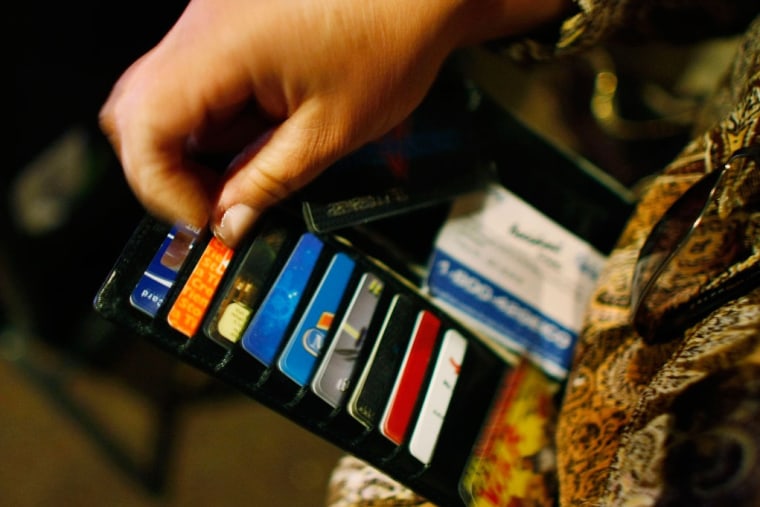Zero interest-rate financing. Store cards with discounts. Cash advances.
As consumers gear up for the holiday spend-a-thon, they will have plenty of opportunities to get into trouble with credit cards. And if they're not careful, they can find themselves with lower credit scores, high interest payments and more.

Holiday spending is expected to increase nearly 5 percent this year, with the average consumer planning to spend $804, according to the National Retail Federation. That can make credit card deals look enticing—and credit card purveyors are ramping up their offerings.
Deferred interest credit card offers, for example, often surface this time of year, according to Gerri Detweiler, director of consumer education for Credit.com. These offers, often announced as "zero percent interest" or "special financing" promotions, typically give consumers a grace period on interest, sometimes for a year or more.
Read MoreZero percent credit cards are back! Five warnings
For a consumer making a big purchase and planning to pay it off within that time, deferred interest plans can be helpful, Detweiler said. But she warned that consumers who leave even a single dollar of charges on the card by the time the deferred interest period is over can be hit with retroactive interest charges on the entire balance they charged.
She had just received a letter from Home Depot, for example, explaining that if she took its deferred interest offer and did not pay it off in full within the specified period, she would be charged interest on all her charges retroactively at a rate of 22.9 percent. (The store's website describes a six-month deferred interest offer with interest rates on unpaid balances ranging from 17.99 to 26.99 percent.)
According to CardHub, a credit card comparison website, paying off your credit card debt one month behind schedule or missing a single payment could increase your financing costs by more than 27 times if you rack up charges under a deferred interest plan. The site has compiled a list of retailers offering deferred interest plans with varying degrees of transparency.
Regulators are keeping an eye on deferred interest offers as well. The Consumer Financial Protection Bureau in September issued a bulletinwarning credit card issuers against "engaging in deceptive and/or abusive acts and practices in connection with solicitations that offer a promotional annual percentage rate (APR) on a particular transaction over a defined period of time."
Opening new credit card accounts is another potential pitfall for consumers. Many retailers encourage consumers to take out store cards, often by offering enticements like a discount on that day's purchases, or by offering a discount if the consumer spends above a certain threshold.
"Some of these offers will be designed to encourage you to spend more," said Jeanine Skowronski, a credit card analyst with Bankrate.com.
High interest rates
But store credit cards often carry high interest rates. And even an application for a new credit card will appear on your credit report, Detweiler said.
"Every time there is an inquiry into your credit file, that's a risk factor and that drops your score," she warmed. "If you open three or four new retail cards over the holidays, you can wind up not only with a lot of debt but also a lower credit score. If you know you are going to refinance a house or buy a car, be careful."
Credit card cash advances are another potential pitfall for consumers. The interest on these is often well above the interest on credit card purchases.
"Stay away from them at all costs," Skowronski said.
For people who really want to shop with cash, Detweiler recommends an alternative to credit card cash advances: a balance transfer. Consumers can ask a card issuer to deposit cash in their account to be used to pay off another card. Often, the interest rate on that balance transfer cash will be lower, Detweiler said—but usually only for a limited time. After that, she said, "any balances left will be charged a much higher interest rate."
Of course, there are ways credit cards can be helpful with holiday spending too. For example, consumer protections on credit cards tend to be stronger than for debit cards: consumers are only liable for a maximum of $50 if they fall victim to credit card fraud, and as soon as the card is replaced they can use it again. Losses on a debit card are capped at a higher level, and it can take longer for a bank to straighten out an account where there has been fraud.
Read MoreMost holiday shoppers undeterred by breaches
Credit card price protection promises can also be helpful. Theseguarantees typically allow a consumer to get a refund if the price on something they purchased drops within a specified period of time.
Read MoreBest credit cards for holiday shopping bonuses
Taking advantage of those guarantees takes discipline, though, as does sticking to a holiday spending plan.
Luckily, new research by David DeSteno, a psychology professor at Northeastern University, points to a different way to improve financial behavior. He and his team asked 75 people to recall times they felt neutral, amused, or grateful, and then asked them to choose between receiving one sum of money today or a different sum in a year. Those who thought about feeling grateful showed twice as much financial patience, the researchers found–they were more willing to wait for a larger financial reward and perhaps less likely to make impulse purchases.
That should give consumers planning to hit Black Friday sales another reason to pause and give thanks the day before.